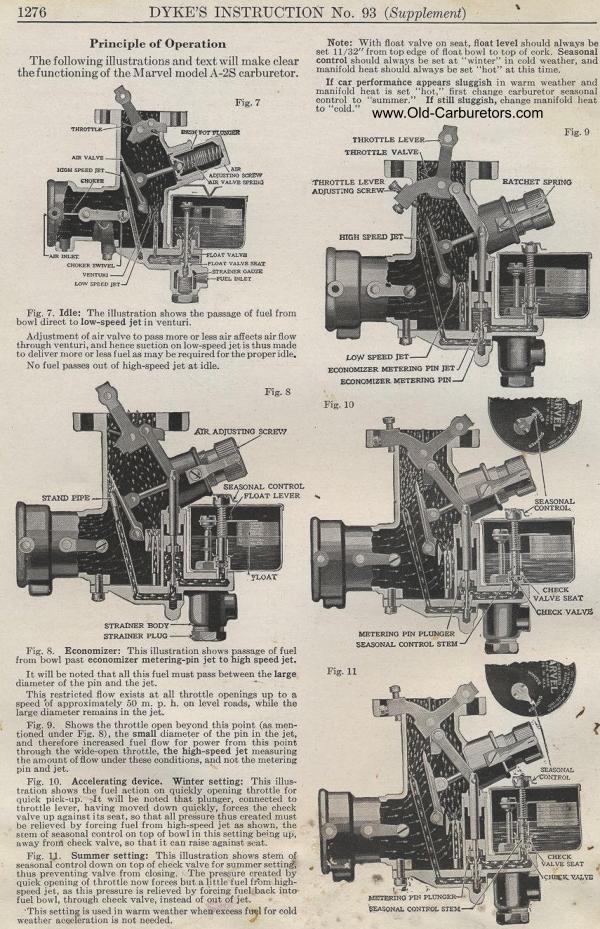Marvel model A-2S carburetor
Fig. 7. Idle: The illustration shows the passage of fuel from bowl
direct to low-speed jet in venturi.
Adjustment of air valve to pass more or less air affects air flow through venturi,
and hence suction on low-speed jet is thus made to deliver more or less fuel
as maybe required for the proper idle.
No fuel passes out of high-speed jet at idle.
Fig. 8. Economizer: This illustration shows passage of fuel from bowl past economizer
metering-pin jet to high speed jet.
It will be noted that all this fuel must pass between the large diameter of the
pin and the jet.
This restricted flow exists at all throttle openings up to a speed 'of approximately
50 m. p. h. on level roads, while the large diameter remains in the jet.
Fig. 9. Shows the throttle open beyond this point (as mentioned under Fig. 8),
the small diameter of the pin in the jet, and therefore increased fuel flow for
power from this point through the wide-open throttle, the high-speed jet measuring
the amount of flow under these conditions, and not the metering pin and jet.
Fig. 10. Accelerating device. Winter setting: This illustration shows the fuel
action on quickly opening throttle for quick pick-up. It will be noted that plunger,
connected to throttle lever, having moved down quickly, forces the check valve
up against its seat, so that all pressure thus created must be relieved by forcing
fuel from high-speed jet as shown, the stern of seasonal control on top of bowl
in this setting being up, away from check valve, so that it can raise against
scat.
Fig. 1.1. Summer setting: This illustration shows stem of seasonal control clown
on top of check valve for summer setting; thus preventing valve from closing.
The pressure created by quick opening of throttle now forces but a little fuel
from high-speed jet, as this pressure is relieved by forcing fuel back into fuel
bowl, through check valve, instead of out of jet.
This setting is used in warm weather when excess fuel for cold weather acceleration
is not needed.
Note: With float valve on seat, float level should always be set 11/32" from
top edge of float bowl to top of cork. Seasonal control should always be set
at "winter" in cold weather, and manifold heat should always be set "hot" at
this time.
If car performance appears sluggish in warm weather and manifold heat is set "hot," first
change carburetor seasonal control to "summer." If still sluggish,
change manifold heat to "cold."
Previous page 1927
Supplement Home Next page 
|